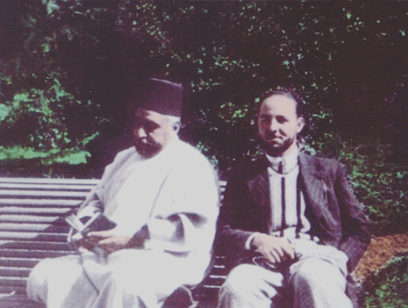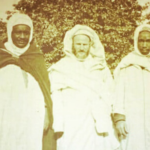Second Section:
This section is dedicated to refuting what the critic Ibn Badis claimed about the Tijaniyyah sect, specifically regarding the Salat al-Fatih prayer and their belief that it encompasses the meanings of the ancient divine words of God. Ibn Badis asserted that the reward for this prayer is contingent upon such belief, which he also denied. This section addresses his arguments and refutes them.
Anyone who has associated with Sufism, the Sufis, or has even taken a step in the spiritual path of al-Junayd al-Salik knows that their spiritual masters experience dialogues with the Truth (Al-Haqq) and hear the Truth speaking to them. This phenomenon is widely known and has been recorded in both dreams and wakefulness, as they have narrated and others have recounted on their behalf. Many have longed to experience this dialogue. For instance, Abu al-Hasan al-Shadhili, whose virtue and sainthood are unanimously accepted by scholars, stated in his Hizb al-Kabir (a prayer he reportedly compiled with the Prophet Muhammad’s permission):
“Grant us a vision accompanied by dialogue.”
This statement indicates his certainty that such divine dialogue occurs; otherwise, he would not have asked for it.
Regarding the divine conversations experienced by the ‘Arifin (knowers of God), it is clarified in Jawahir al-Ma’ani:
“Divine speech for the ‘Arifin does not mean hearing the speech of God’s essence, which is an eternal meaning inherent in Him, because that is explicitly impossible as per the verse: ‘And it is not for any human that God should speak to him except by revelation’ (Quran 42:51), except for our masters Musa (Moses) and Muhammad (peace be upon them), who heard the meaning inherent in the Divine Essence. As for the speech experienced by the ‘Arifin, God creates it within their spirits. When the spirit attains hidden states, He creates within it divine speech, meaning speech directly felt in the soul. There is no doubt that it is from God Almighty.”
This speech is attributed to God in the sense that it is created speech, analogous to how all creation is attributed to its Creator. It is not the eternal speech of God Himself but occurs in a state where the spirit perceives nothing but God, free from error or confusion. In such moments, the spirit becomes like a sacred sanctuary forbidden to anything but the Truth.
During this divine manifestation, the individual experiences a light of sanctity, a sacred mystery of speech, which serves as an intermediary between them and the eternal meanings of God’s essence. They taste a sweetness akin to hearing the eternal speech itself, hence it is described as “hearing the speech of God.”
This divine speech resembles how a dreamer may be told hidden truths through symbols. The dream interpreter explains the symbols, saying, “Your vision indicates such and such.” The knowledge of the unseen does not come explicitly but through a metaphor presented by the Truth. Similarly, divine speech is an intermediary between the knower and the eternal meanings inherent in God’s essence. Scholars refer to this as ‘ilham (divine inspiration).
The speech of God is not limited to the Quran or the other revealed books because the Eternal cannot be confined to a single expression.
Thus, if someone truthful says, “I saw my Lord in a dream, and He spoke to me,” there is no reason to disbelieve them. It is known that God’s speech to His creation did not cease even after the end of revelation.





